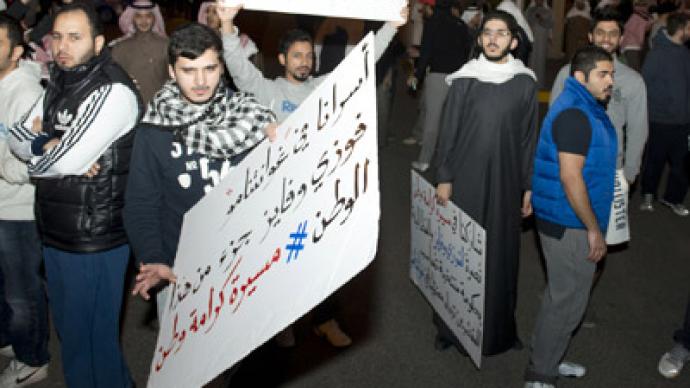Kuwait gives tweeter 2 years’ jail for 'criticizing' rulers

A Kuwaiti court has sentenced a youth activist for allegedly defaming the country’s ruling emir on Twitter. The opposition tweeter is the second person to fall foul of a recent government crackdown on social networking sites in Kuwait.
The court claimed that although the offending tweets written by Ayyad al-Harbi last October did not explicitly mention the emir, it was understood they were meant to insult him. The court sentenced the opposition activist who has over 13,000 followers on Twitter to two years in prison for his supposed crimes.Al-Harbi categorically denied that the tweets had anything to do with Kuwait’s ruling family. He tweeted on the eve of the court hearing that “tomorrow morning is my trial's verdict on charges of slander against the emir, spreading of false news."The defendant’s lawyer, Mohammed al-Humidi commented on the ruling following the trial, saying that the judge’s decision had taken them by surprise.“Kuwait has always been known internationally and in the Arab world as a democracy-loving country," Humidi said in a phone call to Reuters. "People are used to democracy, but suddenly we see the constitution being undermined."Just a day earlier another offending tweeter, Rashid Saleh al-Anzi, was also sentenced to two years behind bars for an incendiary tweet that allegedly "stabbed the rights and powers of the emir."Under Kuwaiti law, those who defame or criticize the ruling emir are committing a state security offense and as such are liable for a jail term of up to five years. Currently, a number of important opposition figures are awaiting trial on similar charges of insulting the country’s ruler.The back-to-back rulings drew the attention of the US, which appealed to the Kuwaiti government to respect human rights and freedom of speech."You know how strongly we feel about locking people up for their use of Twitter," said State Department spokeswoman Victoria Nuland. "We call on the government of Kuwait to adhere to its tradition of respect for freedom of assembly, association, and expression."Public malcontent over Kuwait’s ruling government has increased recently following the parliamentary elections in December. Activists claim that the country’s parliament is dominated by royalist-sympathizers and members of the ruling family. In an effort to quell protest after the elections, lawmakers passed a bill that requires all public demonstrations to have written permission from the authorities.The bill sparked protester ire as more than 1,000 anti-government activists took to the streets, disobeying the new decree. Riot police were deployed with teargas and stun grenades to disperse the angry crowd.Kuwait is widely perceived as having one of the most open and 'democratic' political systems among the Gulf kingdoms. UK-based journalist Afshin Rattansi described the human rights situation in Kuwait as “horrible” and said the country had been all but “forgotten” by the Arab Spring.Drawing comparison with Bahrain, Rattansi said that NATO and the US were reticent to question Kuwait’s “curbs on democratic processes.”“It’s obvious that the US and NATO desire to keep their thousands of troops in Kuwait,” he said told RT.















